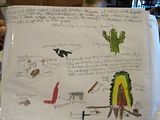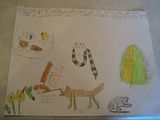Excellent responses here already! We are doing PHFHG's science right now with Riley, and we also did it years back with Wyatt. PHFHG is an important year in science, as it is the first time that this box is written for the student to do independently. This is important, as it is written with the thought in mind that this is the child's first attempt to do science independently, and the directions are shorter, have fewer steps, and use a younger age conscious tone. I have found that doing this box independently is an important stepping stone to doing CTC's science box well independently, as in CTC, the directions become longer, have more steps, and use a more adult tone. Likewise, in PHFHG the science books are easier, the readings shorter, and the concepts are fewer. In CTC, the science readings are harder, the readings longer, and the concepts greater in number.

It's been important for my dc to have their first year of independent science in PHFHG under their belt to be ready for the second year of independent science in CTC.

There are many skills taught in the science box in PHFHG, that would be difficult to fill as well with another program. The science notebooking assignments have students drawing important things learned (i.e. life cycles, etc.), labeling various sketches using newly learned science vocabulary, creating graphic organizers to group information (i.e. classification of living things, etc.), looking up topic specific Bible verses and copying them on the notebooking page, using maps to find information and add to notebooking page (i.e. migratory patterns), using living books as reference materials for accurately drawing/coloring science related topics, etc. Not only does HOD's notebooking teach all of these skills, it also allows for creativity. No 2 children's notebooking assignments will look identical. There are no run-offs, no worksheets, no cut this/paste that provided picture - it is ALL the student's responsibility to help their notebooking page come together right, and to choose what struck them personally to show what they learned and also what they found most interesting. My dc have learned how to use the space on a page in a balanced way, how to organize their work in various ways, and how to get creative with showing what they've learned. For example, here is Wyatt's notebooking page from years ago alongside Riley's notebooking page from the same day of plans this year...


You can see they are similar but different.

I love this aspect of HOD's assignments - they teach many skills but still allow for individuality and creativity to shine through. This is easier said than done.

Oral narrations are also done each week, and these teach dc to retell the science story well. I use the guidelines provided for oral narrating in the Appendix of PHFHG. I show them to Riley, and we talk through what he's doing well and what he can improve upon. One thing I have learned through the years is that HOD has a knack for choosing WHAT to have dc narrate upon. I like the variety of living books dc must learn to narrate from within HOD's science, and I like that they are chosen not only for their excellent coverage of a science topic, but also for their narrative qualities. Not easy to accomplish in science.

Once each week dc must answer 5 comprehension questions based on the science reading. These questions require some searching, some reflecting, and some use of new vocabulary. Living books are used as resources, as is the Bible. I love that the BIble is incorporated in PHFHG's science, and that one of the five questions is always focused upon a Bible application question linked with the science topic each week. My ds is learning to write well on wide-lined notebook paper for this. He is learning to write complete sentences and to read the questions carefully. He is also learning to see living books as resources for finding answers to scientific questions. I like the variety of difficulty of these questions.
The last thing that teaches a ton of things is the experiment and lab form day each week. I have bought many science kits, boxes, and guides through the years, but I must confess that we have not completed most of them. HOD's science experiments are planned every single week, and every single week they get done. Why? They plan for the child to be able to do them, they are written with the child's skills in mind, they use things we have in our home already, they don't take forever to do, they are finished in one session, and they have a Key Idea that explains what they were to get out of it. Genius - pure genius. I was thinking the other day, my oldest ds in sixth grade has done more experiments in HOD than I have done in my lifetime - including my elementary, middle school, secondary, college, and master's years of education.

The thing about science experiments is they all LOOK good on paper, but in the day to day, they often get dropped. Not with HOD. We have not skipped a science experiment ever. That is amazing to me! And, the follow up lab form does a beautiful job of teaching the scientific method. Not to mention dc learn about SCIENTISTS. They learn about the people behind the science breakthroughs, and I think this has helped my dc to begin to think scientifically, especially in regard to solving problems. My oldest 2 sons share a room, and I heard them discussing how they could solve the problem of roads cracking and crumbling. They were talking about erosion, about how cold weather conditions can cause cracks to expand and roads to bulge, how they'd need to find a way to control the temperature of the road and how if this could be kept at a constant that the roads may then not crack as much, how the friction of the tires would still make a difference, how the rocks and natural elements around the road cause abrasion, and...

at this point in my listening I fell asleep.

Anyway, my dc's learning how a scientist's mind works is almost just as important to me as their learning science facts. It produces the scientists of the future.
So, my advice would definitely be to do PHFHG's science next year, as the order is far too tall to be able to replace it adequately, and as it effects not just this year's success in science, but also the next. HTH!
In Christ,
Julie


